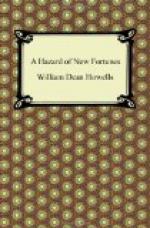“Ah, but Shakespeare couldn’t have been thinking of champagne,” said Kendricks.
“I suppose, sir,” Colonel Woodburn interposed, with lofty courtesy, “champagne could hardly have been known in his day.”
“I suppose not, colonel,” returned the younger man, deferentially. “He seemed to think that sack and sugar might be a fault; but he didn’t mention champagne.”
“Perhaps he felt there was no question about that,” suggested Beaton, who then felt that he had not done himself justice in the sally.
“I wonder just when champagne did come in,” said March.
“I know when it ought to come in,” said Fulkerson. “Before the soup!”
They all laughed, and gave themselves the air of drinking champagne out of tumblers every day, as men like to do. Dryfoos listened uneasily; he did not quite understand the allusions, though he knew what Shakespeare was, well enough; Conrad’s face expressed a gentle deprecation of joking on such a subject, but he said nothing.
The talk ran on briskly through the dinner. The young men tossed the ball back and forth; they made some wild shots, but they kept it going, and they laughed when they were hit. The wine loosed Colonel Woodburn’s tongue; he became very companionable with the young fellows; with the feeling that a literary dinner ought to have a didactic scope, he praised Scott and Addison as the only authors fit to form the minds of gentlemen.
Kendricks agreed with him, but wished to add the name of Flaubert as a master of style. “Style, you know,” he added, “is the man.”
“Very true, sir; you are quite right, sir,” the colonel assented; he wondered who Flaubert was.
Beaton praised Baudelaire and Maupassant; he said these were the masters. He recited some lurid verses from Baudelaire; Lindau pronounced them a disgrace to human nature, and gave a passage from Victor Hugo on Louis Napoleon, with his heavy German accent, and then he quoted Schiller. “Ach, boat that is a peaudifool! Not zo?” he demanded of March.
“Yes, beautiful; but, of course, you know I think there’s nobody like Heine!”
Lindau threw back his great old head and laughed, showing a want of teeth under his mustache. He put his hand on March’s back. “This poy—he was a poy den—wars so gracy to pekin reading Heine that he gommence with the tictionary bevore he knows any Grammar, and ve bick it out vort by vort togeder.”
“He was a pretty cay poy in those days, heigh, Lindau?” asked Fulkerson, burlesquing the old man’s accent, with an impudent wink that made Lindau himself laugh. “But in the dark ages, I mean, there in Indianapolis. Just how long ago did you old codgers meet there, anyway?” Fulkerson saw the restiveness in Dryfoos’s eye at the purely literary course the talk had taken; he had intended it to lead up that way to business, to ’Every Other Week;’ but he saw that it was leaving Dryfoos too far out, and he wished to get it on the personal ground, where everybody is at home.




